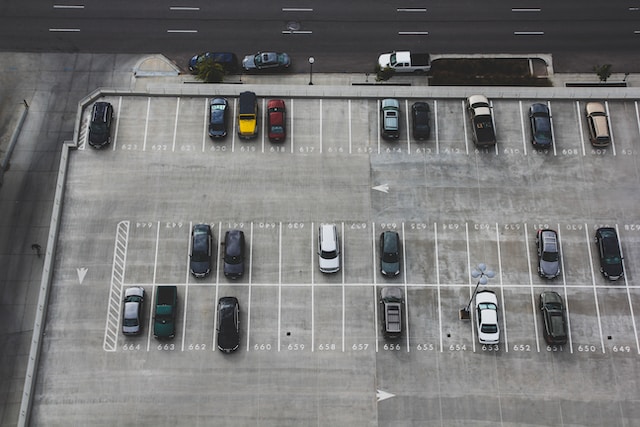
When you park your car at work, or go into a parking garage when you visit the store, do you know there is a whole system in place to make sure you find parking, your car is safe and you’ll be able to get out of the parking again? In fact, the system at work also tries to make sure there are not any major delays in your being able to park.
The basis of this whole affair is a parking management system. Literally, there are computers and software that is dedicated to making your parking experience more efficient.
Whether you rent parking space, or just use a bay occasionally, the whole point of parking is for you to know your car is secure and will be there when you come out. Having a well-managed parking system is the key – and using AI can make it more efficient for you.
What is AI?
Artificial Intelligence (AI) is the process of creating machines or some form of computer that can be taught to solve problems. It works on a system of algorithms that can continuously find possible solutions to problems, then use those to search for other solutions. It changes on an ongoing basis, which means it is always learning.
Think about it like a person whose job it is to find the ultimate answer to a question. Each time there is the tiniest piece of new information, the possible answer changes a little. It also links back to all the possible answers so far, so the search continues, learning new options all the time.
What is a parking management system?
Without making it sound obvious, a parking management system is literally a means of coordinating all the aspects of a managed car park. It relates to controlling access to the parking, paying for parking and recording what happens in a day.
The most important part of the parking management system is making sure that everything runs smoothly: people can get in and out; all parking is paid for, where necessary; the cars are safe; and there is as little congestion as possible.
You’ll recognize a parking management system when you swipe into your parking space at work, or you pay at the machine for parking at the store. You may also have seen the lights that indicate free parking bays.
AI can help to make all these aspects of a parking management system more efficient.
Access
Every parking lot or garage with access control uses technology. Something will allow you to access the parking lot. You may press a button, wave your hand in front of a sensor, or flash a permit. All of the possible options are fed into the computer and it will understand what to look for.
AI takes this to another level by working on patterns of access and using these to predict and solve problems that may occur. If there is a jam because too many people are trying to get into the parking garage at a particular time of day, the AI system may find ways to streamline the access processes at those times.
Payments
Parking management is also about controlling and monitoring how people pay for their parking. This may be on a long-term basis, which means the system must know who has paid and can be let in. It may be per hour, which is another aspect of the program. The system needs to recognize permits on cars, or printed tickets. It must recognize different money and card payment options and allow people to come and go.
An AI system will keep track of how payments work and pose solutions to problems. If, for example, more people pay with cards than with cash at a particular time of day, the AI system will find ways to streamline this.
Recording and reporting
A very important part of managing parking is the recording and reporting, so that trends, details, statistics and the like can be read. This would include tracking the number of cars through the system in one day and details of what bays were used.
Remember that AI can learn. So, you begin with a management system that automatically sends out a daily report of the number of cars and the bays that were used. This is useful and relevant information, but what do you do with it? To use it in any way, you’ll need to put some kind of input into the computer.
However, if the system uses AI, it will begin to pose the solutions itself. The AI will see that there are certain bays that are used more often than others at certain times of the day. When it comes to directing cars to parking spots, it will predict that those spots are likely to be full and send the cars to other spots.
This helps to manage the flow of traffic in a parking garage.
Why is AI so valuable for a parking management system?
What you just remember about AI is that it can learn. Any computer software can be fed thousands, even millions, of scenarios and the possible outcomes of each. In fact, it’s conceivable to set your computer to work out every possible mutation of any situation and to find the corresponding solution you’ve put into it. This still relies on human input.
AI is different. Not only will it respond to many possible scenarios and indicate the possible solutions, it will learn from its own input and be able to add to the outcomes. It won’t keep doing the same thing with similar results. As a system, AI can learn to recognize similarities and to work to find different solutions.
Let’s use the parking system at your work. Imagine that you’ve been allocated Bay 17 as your parking bay. You’ll need to register your car’s license plate, which will be linked to that space. When your car is in the shop and you take another car to work, what then? The system won’t recognize the license plate and you won’t be allowed into the parking lot. The computer will need to be told that this is an exception.
Not with AI, though. An AI system will remember the anomaly of your different license plate. The next time you arrive in the same car, the system will recognize the alternative number and let you in automatically.
How does AI recognize what cars are doing?
One of the innovations of AI when it comes to parking management is the ability to recognize license plates automatically: parking license plate recognition.
The system reads your car’s registration plate as you enter a parking garage. As you exit, the plate is read again. This is useful in managing parking that is paid per hour. The system will tell you automatically how much you owe for the time.
The managers of the parking system can have access to the information in real time, which helps to enforce the rules of the parking facility quickly. This includes dealing with violations of parking rules and also security.
How does AI help keep a parking system dynamic?
Even if there are hundreds of cars that park for a long period, no parking system is static. In fact, some systems, like at the mall, are particularly dynamic, with cars coming and going for different time periods throughout the day.
An AI system can use sensors to detect what cars are doing all the time they are in the parking facility. This helps the system to direct the flow of traffic. Let’s say, for example, there is a meeting at your workplace and there are a number of visiting cars that need parking. In fact, there are more than the visitors’ parking bays can accommodate.
The AI system will use the sensors and the license plate recognition together to direct visitors to bays not occupied by staff on that day. This will make sure the visitors have a place to park, but won’t disrupt the normal flow of traffic.
